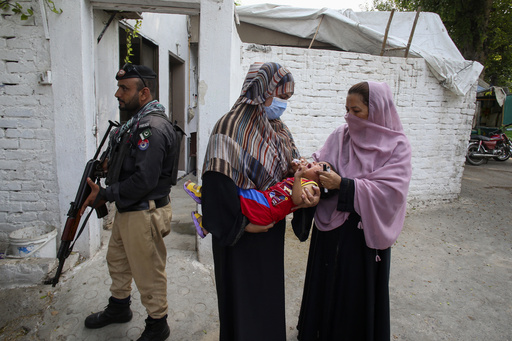
ISLAMABAD — On Monday, Pakistan launched a comprehensive vaccination initiative aimed at immunizing 45 million children against polio. This move comes in response to a troubling rise in new cases that have hindered ongoing efforts to eradicate the disease in a country that, alongside Afghanistan, has yet to eliminate polio entirely.
Regular vaccination campaigns are a staple in Pakistan, but they often face violence directed at health workers and their accompanying police escorts. Extremist groups propagate the false narrative that these vaccination efforts are a Western scheme intended to sterilize children.
This latest campaign marks the third of the year and is set to run through Sunday. Ayesha Raza Farooq, the prime minister’s advisor for the polio eradication program, highlighted the urgency of the initiative by stating, “We are re-energized in our efforts to combat polio,” in light of the alarming rise in case numbers.
The vaccination effort will involve a door-to-door approach where children under the age of five will receive the polio vaccine along with Vitamin A supplements to bolster their immune systems. Recently, Prime Minister Shehbaz Sharif met with frontline health workers, urging them to ensure that no child is overlooked during this campaign.
Anwarul Haq, coordinator of the National Emergency Operations Centre for Polio Eradication, called on parents to support the polio workers fully. He stated, “Polio has no cure, but it can be prevented with this readily available vaccine.”
So far this year, Pakistan has reported 41 polio cases across 71 districts, with the majority occurring in southwestern Balochistan and southern Sindh province, followed by Khyber Pakhtunkhwa and Punjab. The emergence of cases in new areas has raised concerns among authorities, particularly as previous outbreaks were mostly confined to the northwest region bordering Afghanistan.
Local officials are concerned that the recent decision by the Afghan Taliban to halt its door-to-door vaccination efforts will have significant implications beyond its borders. Given the frequent cross-border movement between Pakistan and Afghanistan, health authorities fear potential outbreaks could spread. The World Health Organization has reported 18 confirmed polio cases in Afghanistan this year.
Currently, Pakistan and Afghanistan are the only nations globally where polio transmission has not been eradicated. Polio is highly infectious, particularly in communities where vaccination rates are low; severe cases can lead to permanent paralysis and even death.
